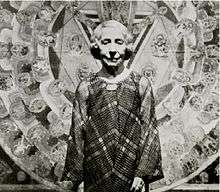Stella Kramrisch

Stella Kramrisch (1896-1993) was an American art historian, who was well known as a specialist in Indian art and Hinduism. She was a professor at the University of Pennsylvania in the Department of South Asia Regional Studies, where she had been recruited by W. Norman Brown, in addition to being a curator at the Philadelphia Museum of Art.
Early life and education
Stella Kramrisch was born on May 29, 1896 in Nikolsburg, now Mikulov, in Austria.[1] She was trained as a ballet dancer growing up in Austria. When Kramrisch was about 10 her parents moved to Vienna. One day she came across a translation of the Bhagavadgita: "I was so impressed it took my breath away."[2] She had found what she wanted to do in her life. She enrolled at the University of Vienna, studying Indian art, Sanskrit, anthropology and Indian philosophy, and earned her doctorate in 1919.[3]
Life in India
That year she traveled to London in 1919 with a university delegation to give three lectures at Oxford. Rabindranath Tagore heard her speak and invited her to come to India and teach at the Visva-Bharati University in Santiniketan in 1922. She was appointed professor of Indian art at the University of Calcutta in 1924, where she taught until 1950. She married the Hungarian economist, Laszlo Nemenyi, an adviser to the viceroy, in 1929. Since they lived in different cities (Calcutta and Delhi), they saw little of each other. After the British left India in 1947, Nemenyi opted to work for the new government of Pakistan and moved to Karachi. In 1950 he was found shot dead on a beach, dressed in evening clothes.[4] After this, she moved permanently to the United States.
Philadelphia Museum of Art
Stella Kramrisch was the Professor of South Asian Art at the University of Pennsylvania for a long period of time. She was also the curator of Indian art at the Philadelphia Museum of Art from 1954 until 1972, and was a Curator Emeritus until her death.[3] In 1981 she curated Manifestations of Shiva, a large-scale exhibition of Indian art and sculpture at the Museum, which was met with both critical and popular success.[5] She is famous for her books on the Hindu Temple, "Principles of Indian Art", and the encyclopedic "The Presence of Siva". She was a friend of the ballerina, designer, actress, and collector Natacha Rambova. Barbara Stoler Miller and Wayne E. Begley were among her students. Prof. Kramrisch was succeeded by Michael W. Meister, who is currently the W. Norman Brown Professor of South Asia Studies and History of Art at the University of Pennsylvania.
Death
Kramrisch died on September 2, 1993 at her home in Philadelphia, Pennsylvania.[1]
Honors
In 1982 the Indian government awarded Kramrisch with its Padma Bhushan award.[3] In 1985 she was awarded the prestigious Charles Lang Freer Medal by the Smithsonian Institution.[3]
Legacy
At the time of her death, Kramrisch left a bequest of 25 works to the Philadelphia Museum of Art.[3] In addition, Kramrisch's curatorial position was officially re-titled as the Stella Kramrisch Curator at the Philadelphia Museum of Art, a position which still exists today.[6]
References
- 1 2 "Stella Kramrisch, Indian-Art Expert and Professor, 97", The New York Times, Retrieved 1 January 2015.
- ↑ A Meeting Of Art, India And Devotion - Page 2 - Philly.com
- 1 2 3 4 5 Sozanski, Edward J. "Indian Art Expert S. Kramrisch Dies at 97", Philly.com, Retrieved 1 January 2015.
- ↑ Dictionary of Art Historians
- ↑ "History: 1980-1990", Philadelphia Museum of Art, Retrieved 1 January 2015.
- ↑ "Historical Note", Philadelphia Museum of Art, Retrieved 1 January 2015.
External links
| Wikimedia Commons has media related to Stella Kramrisch. |
- K.G. Subramanyan on video speaking of Kramrisch in India